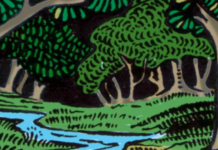
Gathering the Magic: Creating 21st Century Esoteric Groups
, by Nick Farrell
Immanion Press, 1904853161, 259 pp., 2005
‘It is time then that esoteric groups were established along lines that encourage individuals, rather than trying to make them conform’.1
I’ll admit, I often judge books by their covers. I read a lot, but I only have so much time and I’m fortunate in that there seems to be an almost infinite number of books at my disposal – I have to be choosy. I’ll also admit that I was hesitant about picking up this book. I’ll just come right out and say it: the cover is garish. It looks more like a D&D supplement (it’s not) than a serious work on the occult (which it is). After leaving it aside for a few weeks I finally did pick it up. I felt a little guilty, another author acquaintance had sent it in, and I’d been lagging on writing a review of his book, so I thought I’d give this one a go in the meantime – and I’m glad I did. End intro.
Nick Farrell has been a member of several occult groups of varying types, and explains that ‘[a]ll of these groups have provided me with experiences, some good and some bad. This has led me to a basic understanding of how esoteric groups should (and sometimes don’t) work; why some are successful, while others end up destroying themselves, with their former members remaining at ritual dagger point’ (pg 15). Proven several times over with great anecdotes of his experience and others’.
Farrell acknowledges early on that ‘a perfect group does not exist’ and ‘[e]ven the good groups have their problems’, but notes that if ‘you can find someone with experience, or perhaps you have a little bit yourself, there is nothing to stop you from forming your own group to put into practice what would only have been an intellectual exercise’. This is a novel approach for some, taking ownership and responsibility for one’s spiritual development from the outset rather than bemoaning the lack of options available while sitting at home alone. Of course, ‘there are those esoteric teachers who whisper darkly of the dangers of having inexperienced people playing with rituals and setting up groups’, and Farrell acknowledges some truth to that, but also realizes that ‘it is better to be someone who gets off their backside and organises a group than someone who sits down and reads about it and just dreams’.2
There are suggested tests to determine the kind of group one wants to create, and whether one would suit best as a leader or follower. Topics include everything from the elemental nature of the group egregore, to the types of groups, goals and objectives, private or public, grades and titles – and that’s just in the first chapter. Most chapters end with a checklist of tasks to complete to be well on your way to beginning an esoteric group.
Also basic skills such as conflict management are discussed with intelligence and frankly, injected with a healthy dose of humour. Farrell goes right from birth, growth to the death of a group and how that might be handled.
Appendices include an example of a correspondence course, and three group mind building exercises.
So when you’re looking at this book online, or in your local occult shop: don’t judge it by its cover, it is truly an excellent work and would be a definite asset to all interested in joining or setting up an occult group or order.








